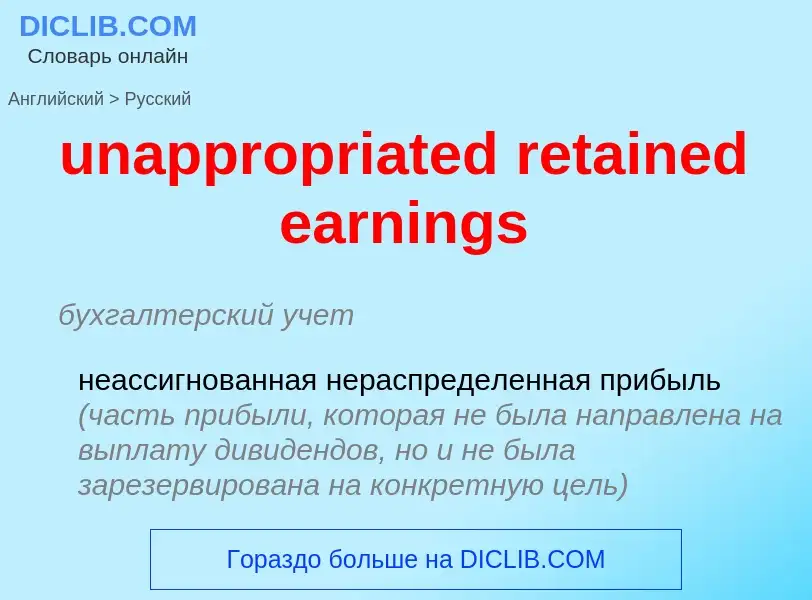Перевод и анализ слов искусственным интеллектом ChatGPT
На этой странице Вы можете получить подробный анализ слова или словосочетания, произведенный с помощью лучшей на сегодняшний день технологии искусственного интеллекта:
- как употребляется слово
- частота употребления
- используется оно чаще в устной или письменной речи
- варианты перевода слова
- примеры употребления (несколько фраз с переводом)
- этимология
unappropriated retained earnings - перевод на Английский
бухгалтерский учет
неассигнованная нераспределенная прибыль (часть прибыли, которая не была направлена на выплату дивидендов, но и не была зарезервирована на конкретную цель)
синоним
Смотрите также
['plau'bæk]
общая лексика
запахивать
превращать в капитал
фразовый глагол
общая лексика
превращать в капитал
капитализировать (прибыли)
Определение
Википедия
The retained earnings (also known as plowback) of a corporation is the accumulated net income of the corporation that is retained by the corporation at a particular point of time, such as at the end of the reporting period. At the end of that period, the net income (or net loss) at that point is transferred from the Profit and Loss Account to the retained earnings account. If the balance of the retained earnings account is negative it may be called accumulated losses, retained losses or accumulated deficit, or similar terminology.
Any part of a credit balance in the account can be capitalised, by the issue of bonus shares, and the balance is available for distribution of dividends to shareholders, and the residue is carried forward into the next period. Some laws, including those of most states in the United States require that dividends be only paid out of the positive balance of the retained earnings account at the time that payment is to be made. This protects creditors from a company being liquidated through dividends. A few states, however, allow payment of dividends to continue to increase a corporation’s accumulated deficit. This is known as a liquidating dividend or liquidating cash dividend.
In accounting, the retained earnings at the end of one accounting period is the opening retained earnings in the next period, to which is added the net income or net loss for that period and from which is deducted the bonus shares issued in the year and dividends paid in that period.
If a company is publicly held, the balance of retained earnings account that is negatively referred to as "accumulated deficit" may appear in the Accountant's Opinion in what is called the "Ongoing Concern" statement located at the end of required SEC financial reporting at the end of each quarter.
Retained earnings are reported in the shareholders' equity section of the corporation's balance sheet. Corporations with net accumulated losses may refer to negative shareholders' equity as positive shareholders' deficit. A report of the movements in retained earnings are presented along with other comprehensive income and changes in share capital in the statement of changes in equity.
Due to the nature of double-entry accrual accounting, retained earnings do not represent surplus cash available to a company. Rather, they represent how the company has managed its profits (i.e. whether it has distributed them as dividends or reinvested them in the business). When reinvested, those retained earnings are reflected as increases to assets (which could include cash) or reductions to liabilities on the balance sheet.

